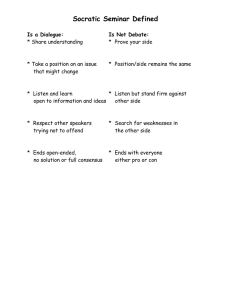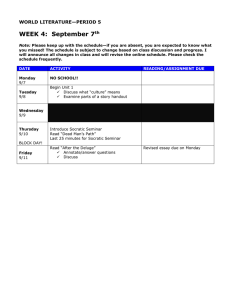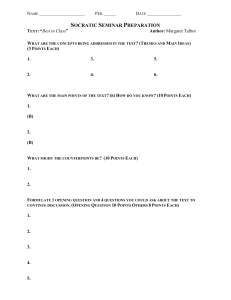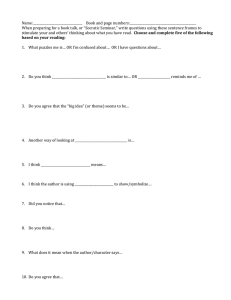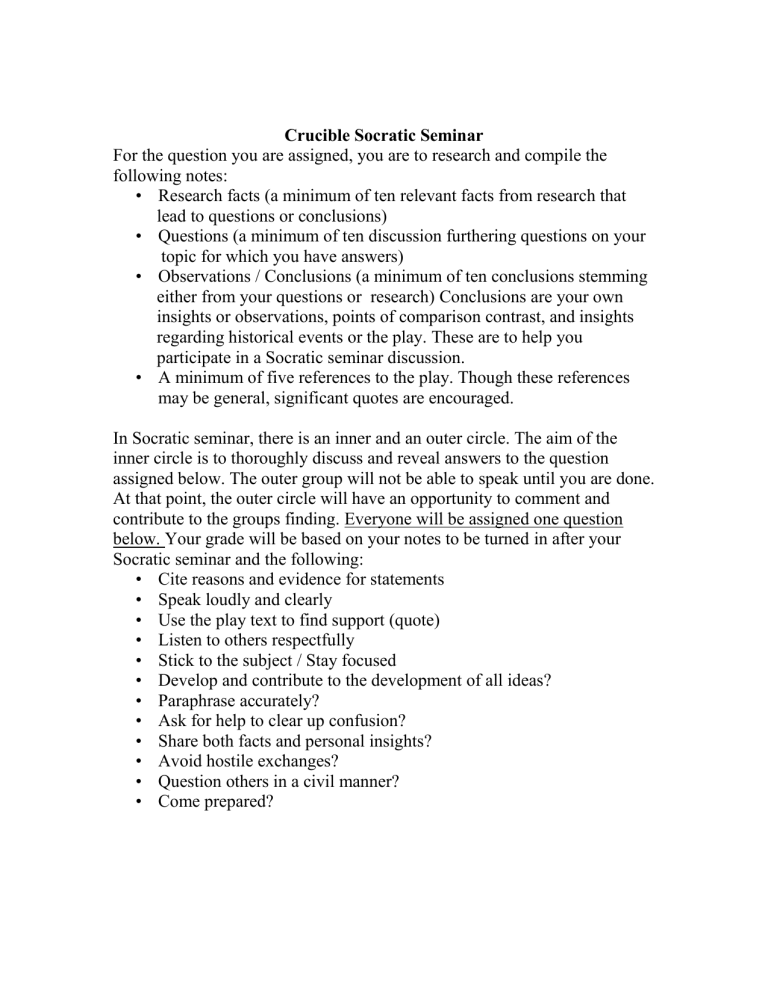
Crucible Socratic Seminar For the question you are assigned, you are to research and compile the following notes: • Research facts (a minimum of ten relevant facts from research that lead to questions or conclusions) • Questions (a minimum of ten discussion furthering questions on your topic for which you have answers) • Observations / Conclusions (a minimum of ten conclusions stemming either from your questions or research) Conclusions are your own insights or observations, points of comparison contrast, and insights regarding historical events or the play. These are to help you participate in a Socratic seminar discussion. • A minimum of five references to the play. Though these references may be general, significant quotes are encouraged. In Socratic seminar, there is an inner and an outer circle. The aim of the inner circle is to thoroughly discuss and reveal answers to the question assigned below. The outer group will not be able to speak until you are done. At that point, the outer circle will have an opportunity to comment and contribute to the groups finding. Everyone will be assigned one question below. Your grade will be based on your notes to be turned in after your Socratic seminar and the following: • Cite reasons and evidence for statements • Speak loudly and clearly • Use the play text to find support (quote) • Listen to others respectfully • Stick to the subject / Stay focused • Develop and contribute to the development of all ideas? • Paraphrase accurately? • Ask for help to clear up confusion? • Share both facts and personal insights? • Avoid hostile exchanges? • Question others in a civil manner? • Come prepared? 1. THE TRIALS How are the Salem Witch Trials and the HUAC Trials similar in terms of arrests, questioning techniques, evidence, behavior of the accused, behavior of the judges power plays / opportunism, the type accused, etc? Your job is to reveal similarities, differences and patterns in an effort to examine the courts’ motives and methods. Discuss Jefferson’s statement, “No government ought to be without censors and where the press is free, no one ever will.” 2. FEAR AND SOCIETY How did fear and mass hysteria affect actions and reveal motives among those in the play (or those of Salem) and those in the McCarthy era. Point out the similarities in both time periods, and reveal the ingredients present in each society that made them vulnerable to such gross errors. Be sure to examine how fear was used to manipulate in both cases. Discuss Murrow’s statement, “No one can terrorize a nation unless we are all accomplices.” 3. MASS HYSTERIA AND AMERICA In what ways have civil liberties in America been compromised in reaction to fear and mass hysteria since the Salem Witch Trials? How are those moments similar to or different from The Salem Witch Trials of 1692. Looking at the present as well as into the future, explore what methods, tools, elements, etc. may contribute to a nationwide mass hysteria today. Discuss Murrow’s statement, “The speed of communication is wondrous to behold. It is also true that speed can multiply the distribution of info that we know to be untrue.” In your research be sure to read Arthur Miller's "Are You Now or Were You Ever?" which can be found at the following web address: http://writing.upenn.edu/~afilreis/50s/miller-mccarthyism.html. You will find info searching “McCarthyism,” “The Red Scare,” and “HUAC Trials.” I recommend using numerous sources to avoid a biased outlook. Some Suggested Links: http://books.google.com/books?id=7sgJeSyKZoYC&printsec=frontcover&source=gbs_n avlinks_s#v=onepage&q=&f=false http://www.associatedcontent.com/article/165049/mass_hysteria_and_paranoia_in_the_cr ucible.html http://www.nps.gov/archive/elro/glossary/huac.htm http://www.moderntimes.com/huac/ http://www.baltimorechronicle.com/spot_apr99.html Background of this method The Socratic method of teaching is based on Socrates' theory that it is more important to enable students to think for themselves than to merely fill their heads with "right" answers. Therefore, he regularly engaged his pupils in dialogues by responding to their questions with questions, instead of answers. This process encourages divergent thinking rather than convergent. Students are given opportunities to "examine" a common piece of text, whether it is in the form of a novel, poem, art print, or piece of music. After "reading" the common text "like a love letter", open-ended questions are posed. Open-ended questions allow students to think critically, analyze multiple meanings in text, and express ideas with clarity and confidence. After all, a certain degree of emotional safety is felt by participants when they understand that this format is based on dialogue and not discussion/debate. Dialogue is exploratory and involves the suspension of biases and prejudices. Discussion/debate is a transfer of information designed to win an argument and bring closure. Americans are great at discussion/debate. We do not dialogue well. However, once teachers and students learn to dialogue, they find that the ability to ask meaningful questions that stimulate thoughtful interchanges of ideas is more important than "the answer." Participants in a Socratic Seminar respond to one another with respect by carefully listening instead of interrupting. Students are encouraged to "paraphrase" essential elements of another's ideas before responding, either in support of or in disagreement. Members of the dialogue look each other in the "eyes" and use each other names. This simple act of socialization reinforces appropriate behaviors and promotes team building. Socratic Seminar Assessment Notes: 25 points Name______________________________________________________________ Fore each bullet below rate the student on a scale of 1-5 (25 pts) 1=very poor / 2=poor / 3=satisfactory / 4=good / 5=very good _____seems prepared and knowledgeable offering research points / findings _____answers others questions, supporting and explaining points _____contributes to and helps discussions evolve, providing questions / insights _____listens to others respectfully and sticks to the subject _____communicates well with others and demonstrates respect at all times 40 pts total Socratic Seminar Assessment Notes: 25 points Name______________________________________________________________ Fore each bullet below rate the student on a scale of 1-5 (25 pts) 1=very poor / 2=poor / 3=satisfactory / 4=good / 5=very good _____seems prepared and knowledgeable offering research points / findings _____answers others questions, supporting and explaining points _____contributes to and helps discussions evolve, providing questions / insights _____listens to others respectfully and sticks to the subject _____communicates well with others and demonstrates respect at all times 40 pts total Socratic Seminar Assessment Notes: 25 points Name______________________________________________________________ Fore each bullet below rate the student on a scale of 1-5 (25 pts) 1=very poor / 2=poor / 3=satisfactory / 4=good / 5=very good _____seems prepared and knowledgeable offering research points / findings _____answers others questions, supporting and explaining points _____contributes to and helps discussions evolve, providing questions / insights _____listens to others respectfully and sticks to the subject _____communicates well with others and demonstrates respect at all times 40 pts total
